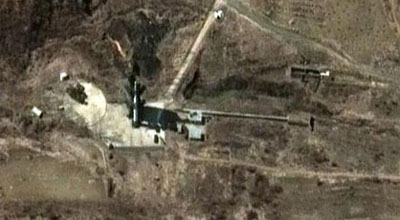North Korea proves the point: ICBMs are proliferatingby Taylor Dinerman
|
| Saturday’s launch may only be a propaganda exercise, a way of proving at least to the captive audience inside its borders that the North Koreans have a fearsome military machine—in spite of the evidence of their own eyes. |
One factor that has not been mentioned (or at least not very prominently) is the possibility that due to the extreme difficulty the North Korean regime has in getting the hard currency it needs to keep its military well-fed and loyal it may sell some missiles to Taiwan. This of course would hit the Chinese in a very sensitive spot: Pyongyang may imagine that it has nothing to lose and that Beijing would swallow the affront rather than see the regime collapse. Taiwan may imagine that it can afford to ignore American concerns because the US has refused to provide them with the F-16s they requested. The scope for miscalculation and overreaching is pretty large and may get bigger.
Japan has indicated that they are considering new sanctions against North Korea. It seems doubtful that the UN Security Council will be able to agree on anything more than another empty gesture. While it is possible that Tokyo may be able to come up with a way to harm the regime in some small way, it is doubtful that by themselves, or even jointly with South Korea and the US, that they will be able to have much on an impact. However, if both Japan and South Korea were to accept the fact that Pyongyang’s missile program is organically linked with that of Tehran, and if they were prepared to follow the logic of this fact, they would apply sanctions to Iran as well. These would have a far greater impact on both nations’ missile development programs than if they and their western allies were simply to apply uncoordinated restrictions on the North Koreans.
Saturday’s launch may only be a propaganda exercise, a way of proving at least to the captive audience inside its borders that the North Koreans have a fearsome military machine—in spite of the evidence of their own eyes. Famine and disease may dominate the everyday lives of the people, but the regime may believe that launching a satellite will somehow make the people feel better about the government. However the real motive may owe more to salesmanship than to politics.
Even if the performance of the Taepodong 2 (renamed the Unha 2 for the occasion) is only about 6,000 kilometers as one expert claimed (or if it is 15,000 kilometers as another one reported) they hope to market as many as possible. They may do better selling parts such as rocket engines, fuel tanks, and guidance systems which can then be assembled into operational missiles at the buyers convenience. The very fact that they were able to get the UN Security Council to go into emergency session may be an additional selling point.
The weak reaction of President Obama, who is promising disarmament while North Korea, Russia, China, France, and the UK, are all either building or making plans to build new nuclear missiles, invites more trouble. George Bush certainly failed to prevent this crisis, even though he can scarcely be accused of not giving diplomacy a chance. This crisis has in fact been ongoing since the Korean War ended in 1953. No US president can be expected to resolve it; they can only be asked to manage it in ways that preserve the peace and the freedom of our allies in Northeast Asia, which above all that means being strong and steady in the face of North Korea’s gesticulations and angry threats.
This should mean that the Obama administration should reconsider its plans to cut the missile defense budget and should demand that North Korea be verifiably denuclearized before accepting any cuts whatsoever in the US nuclear arsenal. The 2002–2003 cuts made by the Bush Administration should be the last ones for a very long time, certainly until the need for a credible, robust, and reliable nuclear deterrent ceases to exist. That will only happen when there is no longer a need to deal with major potential enemies as well as with new nuclear states and, most importantly, the US has a strong and multilayered missile defense complex.
